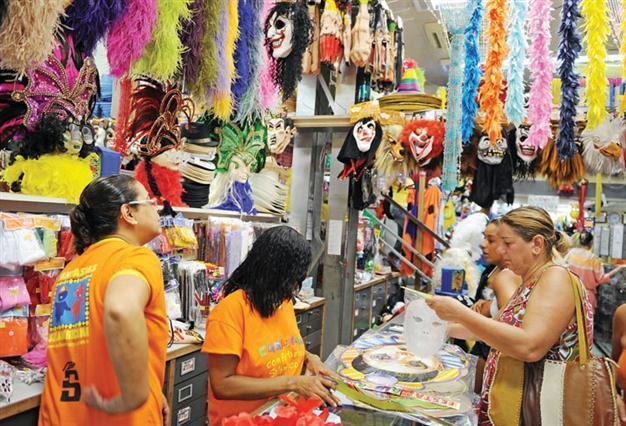Brazil on defensive against Asia
SAO PAULO - Agence France-Presse

Customers shop at a stall selling carnival stuff in the Saara popular market in Rio de Janeiro on Feb 14. Brazil produces only 15 percent of the synthetic fabrics used in carnival costumes, importing the rest from China. AFP photo
Brazil plans to impose strict quality control on imports from China and other Asian nations to prevent the influx of cheap goods, the daily O Globo reported on Feb. 25.
It said the border controls would ensure that imports from Asia, particularly China, meet the standards set by the National Institute of Metrology, Quality and Technology (INMETRO) and comply with safety norms applied to domestic retail goods.
Products which fail the tests would not be allowed into the country.
The measures, seen as a sort of non-tariff barrier protecting Brazil’s domestic industry and consumers, will apply to 240,000 models of goods in the following sectors: textiles, steel products, car parts and children’s items, particularly toys, the Rio-based newspaper said.
Brazil eyes mutualismThe controls are to begin in the second quarter and will be coordinated by the finance ministry’s Federal Revenue Service in partnership with INMETRO.
Brazilian manufacturers have long complained about the influx of cheap Chinese imports.
Earlier this month Brazil and China aired differences over their ballooning multi-billion-dollar trade ties during a high-level meeting attended by Chinese Vice Premier Wang Qishan in Brasilia.
Brasilia urged China to open its doors wider to Brazilian manufactured goods and limit its massive exports of shoes, textiles and other products such as autos that have been flooding into Brazil.
A senior Brazilian official said at the time that the sharp increase in cheap Chinese imports and access to the Chinese market for Brazilian manufactured goods were “an urgent problem which needs to be tackled.”
He added that “the Chinese government signaled that it plans to act.”
In 2009, China dislodged the United States as Brazil’s largest trading partner, with bilateral trade reaching $77 billion last year and Brazil enjoying a trade surplus of some $11.5 billion.
Beijing is also the largest investor in the South American nation.
Iron ore and soybeans represent more than 80 percent of Brazil’s exports to China, which in turn sells mostly manufactured goods to this country. Brazil, the world’s sixth largest economy, and China, which ranks second behind the United States, are members of the BRICS group of emerging powers which also includes Russia, India and South Africa.
